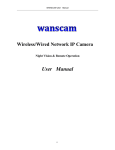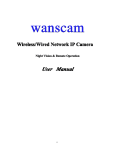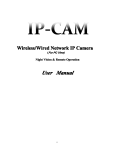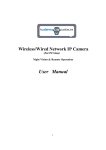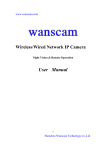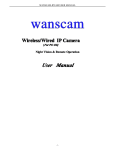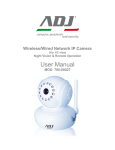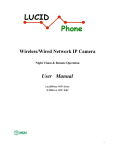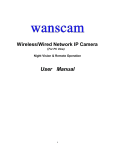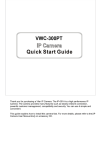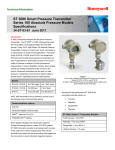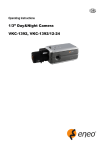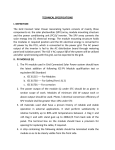Download User Manual - IPCam Central
Transcript
Wireless/Wired Network IP Camera Night Vision & Remote Operation User Manual 0 Thank you for buying our IP camera IPCAMERA AJ Series IP Camera products are designed and equipped for local and remote network video surveillance system, including wired IP bullet camera, wireless IP bullet camera, IP IR dome camera, IP IR waterproof camera, IP Pan/Tilt/Zoom Camera etc. We adopt high performance chip to ensure high quality media processor which processes audio and video collection, compression and transmission. Standard M-JPEG compression format ensures clear and streaming video performance. It enables users to view live video via IE6.0, IE7.0, IE8.0, Firefox, Google browser or other standard browser. IPCAMERA AJ series IP Camera products are applicable for big, medium-sized and small enterprises, chain store, factory, home and all kinds of spots where remote network video transmission and control supposed to be installed, they are easy to be installed and operated. Before the installation of the IP camera, please check if your product accessories in the package are complete Packing List Untie the pack and check the items contained against the following list: ●IP Camera X1 ●Wi-Fi Antenna X1 (only available for wireless model) ●Warranty Card X1 ●DC Power Supply X1 ●CD X1 ●Certificate of Quality X1 ●Mounting bracket X1 NOTE: Please contact us immediately if anything damaged or short of contents. 1 Table of CONTENTS 1. Product Introduction ...........................................................................................3 1.1. Safety Introduction .........................................................................................3 1.2. Product Specifications................................................................................. ....4 1.3. System Requirements........................................................................................5 1.4. Product Views……………..............................................………….................5 1.4.1 Front View................ ......................................................................................5 1.4.2 Interface View.................................................................................................5 1.5. Hardware Installation........................................................................................6 1.6. Software Installation..................................... ....................................................6 2. Software Operation...............................................................................................6 2.1. Search Tool Software................................................. ......................................7 2.1.1. Search The IP address of the Camera.............................................................7 2.1.2. Configuration of the Network............................ ............................................7 3. Real-Time Video Demonstration................................... ......................................9 3.1. Camera Login.............................................................. .................. ...................9 3.2. View via IE Browser.........................................................................................10 3.3. View via Safari, Firefox, Google Browser. .................. ...................................13 3.4. Main Menu interface Introduction....... ............................................................14 3.5. Administer Setting Instruction......................... ................................................15 3.5.1. Multi-Device Settings....................................................................................16 3.5.2. Basic Network Settings.............. ...................................................................17 3.5.3. Wireless Settings.......................................................... .................................18 3.5.4. ADSL Settings................................................................................................19 3.5.5. Dynamic DNS Settings...................................................................................19 3.5.5.1. DDNS Setting .............................................................................................22 3.5.5.2. Port Forwarding Settings......... ...................................................................23 3.5.5.3. DDNS Register........ .................. ................................................................25 3.5.6. Email and FTP Service Settings....................... .............................................29 3.5.7. Alarm Service Settings............................. .....................................................29 3.5.8. Reset/Firmware Upgrade Settings............... ..................................................30 3.5.9. Restore Factory Settings...................... ..........................................................31 3.5.10 Reboot Equipment.........................................................................................31 4. Warranty........... ...................................................................................................32 2 1. Product Introduction 1.1 Safety Instructions (1). Use the proper power source. Do not use this product with a power source that supplies more than the specified Voltage (100-240V AC). (2). Never insert anything metallic into the camera. Inserting metal object into the camera can be a source of dangerous electric shock. (3). Do not operate in wet or dusty environment. Avoid places like a damp basement or dusty hallway. (4). Do not attempt to disassemble the camera. You may be subjected to severe electrical shock if you attempt to take apart the camera while the camera is connected to its power source. If there are any unusual sounds or smells coming form the camera, unplug it immediately and contact Customer Service. (5). Handle the camera carefully Dropping the camera on any hard surface may cause a malfunction. If the camera does not work properly due to physical damage, please contact Customer Service for repair or exchange. (6). Apply to FCC and CE Rule This device complies with part 15 of the FCC and CE Rules. Operation is subject to the following two conditions: 1: This device may not cause harmful interference. 2: This device must accept any interference received, including interference that may cause undesired operation. Any changes or modifications not expressly approved by the party responsible for compliance could void the user user’’s authority to operate the equipment. This equipment complies with FCC and CE radiation exposure limits set forth for uncontrolled environment. This equipment should be installed and operated with minimum distance 20 cm between the radiator & your body. This transmitter must not be co-located or operating in conjunction with any other antenna or transmitter. 1.2. Product Specifications *- Adopt high Performance, strong function media processor 32Bit RSIC *- High sensor CMOS *-Adopt optimized MJPEG video compression algorithm, realize high-definition images transmission in narrow bandwidth; *-Maximum support 15 users viewing at the same time, no limit for users if using forwarder 3 Server function; *- Built in Web Server, convenient for users to use standard browse to realize the real time monitoring and setting administration; 802 11b/g wireless networking; *-Support WIFI WIFI:802 802.11b/g *-Support remote system update; *-Support DDNS analysis, support LAN & Internet (ADSL,Cable Modem) *-Support variety of network protocol: TCP/IP, UDP, SMTP, PPPoE, Dynamic DNS, DNS Client, SNTP, BOOTP, DHCP, FTP, SNMP, WIFI/802. 11b/g *-Parts of modes products support one/ two way audio, talkback; *-Support motion detection alarm function (area & sensitivity Configurable); *-Support image snapshot *-Abnormal automatic recovery function, auto reconnection available when network Interruption occurred. *-Dynamic alarm function, alarm time-schedule configurable. 4 3. System Requirements 1. 1.3 DDNS Supports there-level account, password, user authority management Free DDNS bounded i.e., http://demo.vipcam.org Cell Phone View Support Iphone,Android cell phone view . Lens Type Glass Lens Standard : 4-9 mm Zoom Image Compression Image Frame Rate 3 Times Optical Zoom Resolution 640 x 480(VGA), 320 x 240(QVGA) Flip Mirror Images Vertical / Horizontal Light Frequency 50Hz, 60Hz or Outdoor Video Parameters Brightness, Contrast Night Visibility 22 Φ5 IR LEDs, Night visibility up to 15 meters Filter Switch Built-in IR Cut,With self-check function,Double optical fliter automatic switch, no color deviation indoor or outdoor. Rotation Angle Pan:355°, Tilt: 90° Rotation Speed Pan:5°- 50°/ Second Preset Web Browser: 16 preset positions, CMS Software support 108 preset positions Ethernet One 10/100Mbps RJ-45 Supported Protocol HTTP,FTP,TCP/IP,UDP,SMTP,DHCP,PPPoE,DDNS,UPnP etc. IP Mode Dynamic IP address, static IP address, PPPOE Online Visitor Support 4 visitors at the same time Wireless Standard IEEE 802.11b/g/n Wireless Security WEP, WPA, WPA2 Encryption Product Type Metal Dome type / Waterproof outdoor use Power Working Temperature DC12V 1A Working Humidity 95% RH System Security Features Lens Video Pan/Tilt Network Wireless Others Size Alarm System Certificatio n Warranty MJPEG 15fps(VGA),30fps(QVGA) Tilt:5°-30°/second -10~50 °C Item size: 220mm x 128mm x 230mm (LxWxH) Packaging size: 270mm x 260mm x 170mm (LxWxH) Weight N.W.: 1655g G.W.: 1855g (Note:Actual Weight Final) Accessories Adaptor, CD (including manual), Bracket, Screw Alarm Detection Motion detection ,Motion Detect Sensibility can be adjusted Alarm Action Support Email photo, FTP photo etc. Supported OS Microsoft Win98 SE/ME/2000/XP/Vista/Windows7/Mac OS. Browser IE6.0, IE7.0, IE8.0, FireFox, Google or other standard browser CE,FCC,RoHS Limited 2-Year warranty 5 4. Product Views 1. 1.4 1.4.1 Front View Figure 1.1 4.2 In terface View 1. 1.4 Interface 2 Figure 1. 1.2 1: Audio Out , 2: Audio In 3: Ethernet interface: RJ-45 interface. Power Supply Light: constant on after power up Network light: constant sparkle after power up data transmission. 4: Antenna: 5: Power input interface: connect direct current 5V Power 6 1.5 Hardware Installation Follow the steps below to set up your camera hardware. Make sure to follow each step carefully to ensure that the camera operates properly 1. Install the Wi-Fi antenna (For wireless model) . 2. Plug the power adaptor into camera 3. Plug the network cable into camera, the other side to the router/switch 4. It takes approx 30 seconds to boot up the camera, then you will find the IP address from Search Tool “Search Tool”” (Figure: 1.8) 5. When the power on and network cable connected, the green led of the real panel will keep on, The yellow led will keep flash. 3 Figure 1. 1.3 1.6 Software Installation 4 Figure 1. 1.4 Open the CD Install the follow software: ”—“ Next ”—“ Install ”—“ Finish ”. 1. ActiveX: Click “OCX setup setup”—“ ”—“Next Next”—“ ”—“Install Install”—“ ”—“Finish Finish” 7 2. Search Tool: Open the CD, click ,The Search Tool will run automatically.( No need to install. You can copy this software to your desktop.) 5 Figure 1. 1.5 2. Software operation 2.1 Search Tool Software 2.1.1 Search the IP address of the camera camera. When the device has been mounted properly, you can double click the Icon “ ” run this IP address search tool. 8 Figure 2.1 Note: The software searches IP Servers automatically over LAN. There are 2 cases: 1. No IP Cameras found within LAN. After about 1 minute search, the Equipments List Field not show the IP address address.. 2. IP Cameras have been installed within LAN. All the IP Cameras will be listed and the total number is displayed in the Equipments list field as shown in Figure 2.1 Note Note: 1. Current Computer indicates the Computer’s IP Address information. 2. Equipment information indicates the IP camera’s IP Address information. ”, “Gateway ”, “DNS Server ” is not as 3. If you find that the camera camera’’s “Subnet Mask Mask” Gateway” Server” some as your current computer computer’’s. You need try to change the camra camra’’s IP address. 9 ”, “DNS Server ” is the same as your router Make sure the “Subnet Mask Mask””, “Gateway Gateway” Server” router’’s or your current computer computer’’s. 4. If you don don’’t know how to configure your camera camera’’s IP address. You can click “ Update Update”” button. The Search Tool software can help you configure a usable IP camera automatically. 2.1.2 Configuration of the Network Once your camera camera’’s IP address address’’ Subnet Mask, Gateway, DNS Server is the same as your PC or router, you need configure the camera camera’’s Network parameter manually. IP address: Fill in the IP address assigned and make sure it is in the same subnet as the Gateway Gateway, and the subnet should be the same as your computer or router. (i.e. the first three sections are the same) Subnet Mask: The default subnet mask of the equipment is: 255.255.255.0. You can find the subnet mask from your PC or router. Gateway: Make sure it is in the same subnet with PC’s IP address .Here gateway is the LAN IP of your router. Primary DNS: IP address of IPS network provider. You can also set it as the same as the Gateway. NOTE NOTE: You can find out the Subnet Mask Mask, Gateway Gateway, Primary DNS of your PC from the “Search Tool” software. Http Port: LAN port assigned for the equipment, default is 99. You can change the port number to any one you want such as : 98,211,9999 etc. 10 Figure 2.2 the numbers are not the same Change the camera information: If necessary(the same), you need to change the camera information, Port, IP, or Gateway. There are two ways to change them. Figure 2.3 11 Figure 2.4 3: Real-time Video Demonstration. 3.1. Camera Login Login:: You can access the camera through IP Camera Tool or IE, Firefox, Safari, Google Chrome or other standard browser directly. 1. Double click the IP address of the IP Camera listed (Figure 2.1). The default browser you use will run automatically and come to the camera login interface. (Figure 3.1) 2. To access the camera by IE Browser directly, just type the camera’s IP address, for example, if the camera’s IP address is 192.168.1.99:99: 12 Figure 3.1 Default username: admin Password: no password. Input the correct user name and password, the Sign In interface will pop-up. There are three models to login (figure 3.2).. Figure 3.2 (1) Active Mode (For IE Browser): available in IE6.0 or above explorer (2) “Server Push Mode”: available in Firefox, Safari, and Google Chrome browser. (3) “Snap Motion Mode”: available in Mobile phone 13 3.2. View via IE Browser. Choose Active Mode (For IE Browser) Browser),, and sign in. The first time login the camera, maybe get ActiveX prompt as the picture above, please click the prompt and choose Run Add-on Add-on,, refresh and login the camera again, then will see live video, details as below: Figure 3.3 Windows XP system Figure 3.4 Win7 System 14 Figure 3.5 Note: If there is still no live video after run ActiveX, please try to enable the ActiveX options of IE security settings, please do the follow steps: 1. Close the firewall of your computer. ” browser > “Tool ” > “Internet Options ” > “Security ”> 2. Change the ActiveX settings, “IE IE” Tool” Options” Security” ”, all the ActiveX options set to be “Custom Level Level”” > “ActiveX control and Plug-ins Plug-ins” “Enable Enable””: Especially: Enable: Download unsigned ActiveX controls Enable: Initialize and script ActiveX controls not marked as safe Enable: Run ActiveX controls and plu-ins 15 Figure 3.6 ” menu-> “Internet Explorer ”, choose “Internet In Addition Addition:: you can also click “start start” menu->“ Explorer” ” -> “Internet Explorer ”, enter to Security setting. attributes “ to enter, or via “Control Panel Panel” ->“ Explorer” 3. If there is still no image, please close your anti-virus software, and then try step 1 & 2 again. 4. If you allowed the Active X running, But still could not see live video, Only a Red Cross in the center of the video, And the device status light change to yellow color , not green please change another port number to try, Don Don’’t use port 80, usd other port such as99, 199 etc. Figure 3.7 16 NOTE NOTE: Make sure that the firewall or anti-virus software doesn doesn’’t block the software or ActiveX. If you couldn couldn’’t see live video, please close your firewall or anti-virus software, and try again. 3.3. View via Safari, Firefox, Google Browser Choose Server Push Mode (For Safari, Firefox, Google Browser) Browser),, and sign in Server Push Mode doesn doesn’’t support ActiveX, so some functions are not available, such The speed control bar, Zoom etc.), if you want to use As Record Record,, Audio Audio,, Talk Talk,, Speaker, Speaker,The etc.),if these functions, please use IE Browser. The Control Interface in this mode is as bellow: 17 3.4. Main Menu interface introduction Take the “Active Mode(For IE Browser) Browser)”” For example: 18 Figure 3.8 The Pan/Tilt Feature only work when the cameras have this Pan/Tilt function. This option enables log detection. After the online user clicks this button, a log is entered into the camera camera’’s Log Data documenting the IP address of users who have accessed the IP camera. This Option enables alarm detections too. This button make the camera Vertical cruise (for the Pan/Tilt Cams). This button make the camera Level cruise (for the Pan/Tilt Cams). This button flips the image vertically. This button flips the image horizontally. This button for turn on and turn off the IR LED Light. Control the speed of the Pan/tilt. Only work for the Pan/tilt Cams. This button for setting the Preset of the camera. Only work for Pan/tilt Cams This setting changes the color of the OSD lettering. This setting changes the image resolution. 19 This setting changes the image frequency. This setting changes the image brightness. This setting changes the image contrast. This option resets all main menu options to factory default. This option opens the camera camera’’s recording functionality menu. This option takes a snapshot of the current screen and saves the snapshot to the PC PC’’s Hard Drive. This option enables User-to Camera audio. If the online user This option enables Camera-to-User audio. If the online user has speakers connected and configured to their PC, clicking this option will allow them to hear audio from the location of the camera. This option enables the camera camera’’s Network Indicator LED light turn on or turn off. This button opens the IP camera camera’’s Backend Menu These options enable single view, quad screen view, or 9 screen view: This function serves no purpose unless you have more than one camera connected and configured to your interface. * Please refer to section 8.1.1 Multi-Device Settings* This feature is only supported by the PTZ IP Camera. Enable the Zoom Function. 3.5. Administrator Setting Instruction When login as Administrator, you can enter the IP Camera for Administrator. Administrator supports all the settings and operations of the camera; you can set and control it freely There are some special functions only for administrator as below: Alias setting : You can set your favorite device aliases,that is the name of your camera. Date&Time set : Setinging the date and time. Uer settings : Can be set up to 8 users. On this page you can set up accounts of the user name, password, as well as in their packet (administrator, operator, visitor). � Visitor : In this mode, you can only visit. � Operator :You can set the direction of the lens device, set the video screen’s brightness, contrast and other parameter. � Administrator : You can set the device advanced configuration. UPnP set :If you want internet access IPCAM, to ensure that the state is successful UPnP. Device Firmware Upgrade: The system firmware update the device firmware and application of Web UI Restore factory settings : When there is not a response when the error occurred, you can restore the factory settings to resolve the device. Reboot the device : You can reboot the device. Back: Return to monitor mode. 20 3.5.1 Multi-Device Settings � Add a local area network equipment In the multi-device configuration page, you can see all the equipment inside the LAN. The first device is the default device. You can add more devices listed in the list of equipment. Embedded applications, up to 4 devices at the same time-line. Click the ” in the “second road equipment equipment”” and double-click “Current list of devices in the LAN LAN” device entry name, host address, Http port will automatically be filled, require the user to fill in the correct account name and password, click “Add. ” Repeat this process you can Add.” ” button. continue to add devices. Finally do not forget to click on the “Settings Settings” 21 Figure 3.9 � Add a device on the internet First, make sure you want to add devices to access via IP address or domain name. For example:http://202.96.133.134: 9008 or http://IPcam.dyndns.org:9008 http://IPcam.dyndns.org:9008.. And then fill in host address: 202.96.133.134 HttpPort: 9008 or host address: IPcam.dyndns.org Http port: ” Repeat 9008. and fill in the correct account name and password to the last click on “Add. Add.” the above steps can add other devices 22 Figure 3.10 3.5.2 Network Settings Figure 3.11 port forwarding is needed, If you This sector is for DHCP and IP configuration configuration,port please fill in the relative IP address subnet mask, gateway, DNS want to set IP address address,please address、subnet server, Http port; 3.5.3 Wireless Settings 1. Make sure the router is a wireless router. 2. Make sure the Wi-Fi antenna tighten up up.. 23 3. Make sure whether there is encryption of the WLAN of the router, if there is encryption, keep the key. Attention: No special characters in the SHARE KEY. ”>”Scan ”, please scan 2times, 4. Login the camera, click >“Wireless Lan Settings Settings” Scan” then you will find the WLAN from the list, choose the one you use. ”, if there is encryption, please input the key, 5. If there is no encryption, just click “Submit Submit” then click “Submit Submit””. 6. Wait about 30 seconds, the camera will reboot, then unplug the network cable. Figure 3.12 3.5.4 ADSL Setting When your device directly connected to the Internet via ADSL, when you need to enter fill in your ISP service providers obtain from the account name and password. Duly completed and click “Settings Settings”” button. Your device can connect to the internet has. Figure 3.13 3.5.5 Dynamic DNS Setting (DDNS) 3.5.5.1 DDNS Setting: 24 (1): Click > “DDNS Service Settings Settings””. Figure 3.14 (2): Choose the DDNS DDNS,, there are 4 kinds of options: (1): Manufacturer Manufacturer’’ DDNS DDNS:: We provide a free DDNS: vipcam.org vipcam.org.. This domain is provided by manufacturer. Note: 88safe.com is old DDNS provided by manufacturer also. If you want to use the manufacturer’s free DDNS, Please Choose “ vipcam.org “. Figure 3.15 (2): The Third Party DDNS DDNS:: This domain is provided by the 3 rd party, such as Dyndns, Oray, 3322 ” If you use the third party DDNS, please choose the server you need need,, such as “3322.org 3322.org” or “dyndns.org or“ dyndns.org”” as below: 25 Figure 3.16 Figure 3.17 You have to register an account firstly, keep the user, password, host, then fill in it. Note: Only one DDNS can be chosen, for example, if you use manufacturer manufacturer’’s DDNS, the 3rd party one won won’’t work, if use the 3rd party DDNS, the manufacturer manufacturer’’s one won won’’t work. 3.5.5.2 Port forwarding settings settings:: 1: Setting the IP address of the camera The default IP address of the camera is : Http://192.168.1.99:99 The default IP address of ra you can change to any other one you like, such as came camera as:: Change to: 192.168.1.109:109. or 192.168.1.99:90 etc. ” then the Click “Apply Apply””>fill in the user name and password of the camera>click “OK OK” camera will reboot, wait about 30 seconds. You will get your changed IP address. 26 Figure 3.18 ”, “DNS Server ” is the same as your router Make sure the “Subnet Mask Mask””, “Gateway Gateway” Server” router.. 2: Setting Port Forwarding in the router. This is the most important step. Set port forwarding in router refer to the IP of your camera correctly, then the DDNS will work. Because there are so many kinds of routers from all over the world, so it it’’s difficult to show a fix steps, but there are some samples of different routers routers’’ port forwarding settings as below, just for reference: TP-LINK: (1) Login the router. ” (2) Choose “Forwarding Forwarding””, select “Virtual Servers Servers” (3) Click the Add New button, pop-up below: ), IP address of the camera, then click Save Fill the service port (except 80 80), The port and IP address should be the same as Camera. 27 BELKIN: (1) Login the router. ” (2) Choose “Firewall Firewall””, select “Virtual Servers Servers” (3) Input the port (except 80 80)) and IP address, then click save. Note: The port and IP address should be the same as Camera. Figure 3.19 DLINK: (1) Login the router. ” (2) Choose “Advanced Advanced””, select “Virtual Servers Servers” (3) Input the port, IP address, Protocol, then click save. Note: The “public port ” should be the same as camera port”” & “private port port” camera’’s port, choose the protocol to be “both both””. 28 Figure 3.20 After all these 4 steps done, then you can use the DDNS freely, check the DDNS status from the camera as below, and get the link of DDNS for internet view. Step: “Login Login””>” ”: ”>”Device Info Info” Figure 3.21 3.5.5.3 DDNS Register For example, you can go to Dyndns website to register a free account. http://www.dyndns.org / http://www.dyndns.com http://www.dyndns.com.. Step1: enter http://www.dyndns.com/ and Create Account 29 Figure 3.22 Step2: Set the username and password as below: Figure 3.23 Step3: After a minute, you will receive a E-mail from DynDNS Support and it will give you a confirmation address (e.g. https://www.dyndns.com/confirm/create/ONMzltcCBk6mcHJI5MhVD0g https://www.dyndns.com/confirm/create/ONMzltcCBk6mcHJI5MhVD0g)) 30 Figure 3.24 Figure 3.25 Step4: When the Account Confirmed, login and start using your account. Choose Add 25 26 )page. Host Services(Figure 3. 3.25 25)) and enter Add New Hostname (Figure 3. 3.26 26)page. Figure 3.26 31 27 Figure 3. 3.27 Step5: On the Add New Hostname page. 1) input your Hostname. 2) choose Host with IP address 3) click Use auto detected IP address xxx.xx.xx.xxx xxx.xx.xx.xxx.. Then click Create Host. ” 4) after you have added a New Hostname , you need “Proceed to checkout checkout” Figure 3.28 32 Figure 3.29 Figure 3.30 30 ),and can use it in the DDNS Step6: Now you obtained a Dynamic Domain Name(Figure3. Name(Figure3.30 30),and 5.5 Service Settings(details: 3. 3.5.5 5.5)) Notice: If you have a dynamic IP address, Make sure you have download the DynDNS DynDNS’’s “Update ”. And installed it succeed in your computer. Client Client” Figure 3.31 33 3.5.6 E-mail and FTP service Settings Figure 3.32 The above setting is a preparation for the alarm function, the sender should be recipient 1、2 2、3 3、4 4 is filled with recipient E-mail entered the sender sender’’s email address address,recipient SMTP server should be filled with the sender email SMTP server e.g. the address address;SMTP server,e.g. sender email address is [email protected] and enter mail.163.com. Generally SMTP port [email protected],and do no need to change when needs to check, just tick it, and enter SMTP user is 25 25,do change;when both of them are provided by Email provider and test according and SMTP password password,both provider,and when needs to send, please tick Email notification Internet IP address to reference reference;when address; The e-mail server and other information can be obtained from the mail service provider the email notification is image captured when alarming if no email notification is needed when alarming, and then no need to enter. Set up FTP service, you can fill in parameters like following: 34 Figure 3.33 when alarming is The above setting is equally similar to Mail Server Settings Settings,when Triggered , it also sends image please enter FTP server FTP FTP user FTP Triggered, image,please server、FTP port port、FTP user、FTP FTP mode FTP mode has two options: PORT and password, FTP upload directory directory、FTP mode,FTP second POSV. If needs a quick upload image, then select it, edit upload image interval interval(second second).. Pay attention: To make Mail service and FTP function work, you should make sure that your camera can be accessed from internet, besides, all the parameters should be right. 3.5.7. Alarm Service Settings As shown below, there are two modes of alarm trigger, first one is motion detection, the sensitivity of motion detection can be adjusted please refer to below interface interface,the according to the users users′′ requirement, the higher the number is, the lower sensitivity is; Another mode is input alarm, when connected, it triggers alarm through alarm input signal which connects to linkage alarm GPIO; one is IO alarm linkage, camera connects When triggered, there are 3 alarm modes modes:one the second is email with linkage alarm box through GPIO, sound the siren ;the the last is upload pictures alarm as the notification, send email with images captured captured;the alarm,as second way mentioned before FTP upload pictures alarm, Upload pictures interval interval(second second) keeps consiste nt with the mentioned upload pictures interval of Ftp service settings. as the selected time interval 00 minute per The schedule refers to arming time time,as interval: 0:00 45 minutes and Monday 1:00 00 hour and 2:00 00 hour week to 0:45 Figure3.34 35 3.5.8. PTZ Settings This sector is for adjusting the speed of PT, pan left&right,tilt up&down. Reset &Firm ware upgrad ing 3.5.9 3.5.9Reset Reset& Firmw pgrading ing This sector is for camera firmware upgrad upgrading ing,, it includes device system firmware and device application firmware Be cautious to apply for it it,, it is risky to upgrade your camera. Figure 3.35 10 Restore Factory Settings 3.5. 3.5.10 When users forget password, we can restore ex-factory settings, when click, a picture will pop up, Click ok, and wait for 1 minute and you can use it normally. User setting feature restores 36 . Figure 3.36 3.5.1 1 Reboot Equipment 3.5.11 Click restart, it appears the above picture, click ok, wait for 1 minute and you can use it normally normally.. Figure 3.37 2 Go to Camera 3.5.1 3.5.12 Camera grabs your equipment MAC number to website processing automatically, equipment's MAC number is unique. This function can not need to set up the DDNS and UPNP, that is, they have no relationship, but, as premise, your comera can be visited from internet. That means the camera IP must be set to the outer network IP address.Equipment default ip 192.168.1.99 can not be connected with gotocamera. 37 Register Register:: according to prompts prompts,, step by step to fill in writing. After he account number is registered registered,, you will receive a verification email sent to your mail box. Finishing the test and verify, then you got a Gotocamera account. 38 39 40 4 Warranty Under normal use condition, products resulting from its own failures in the warranty period will be free maintenance. Warranty Terms as following: a) Charge-free maintenance of the product is one year. We can repair it for free during the guarantee period (Damages not caused by misuse or vandalism). Repair over guarantee period, we will charge maintenance fee. b) During guarantee period, breakdown caused by misuse or other reasons out of 41 range of warranty. You could ask repair depend on the card. We only charge for changed components, the maintenance charge is free. c) When the products need maintenance, hand up the card with products to the manufacture or local distributor. d) Take apart item crust, tear up the sealing label privately, this is out of warranty range. e) We do not accept the damaged item due to modification or add other functions. The Following Circumstances will not be free warranty a) Period check, maintenance or change components due to normal attrition. b) The damages due to crash, extrusion, artificial flooding, moisture or other personal reasons. c) The damages due to floods, fire, lightning strike and other natural calamities or force majeure incidents factors d) Repaired item by non-authorized repair centers. All above terms, if changed, regarded to relevant regulations. THAT THAT’’S ALL, THANK YOU! 42











































